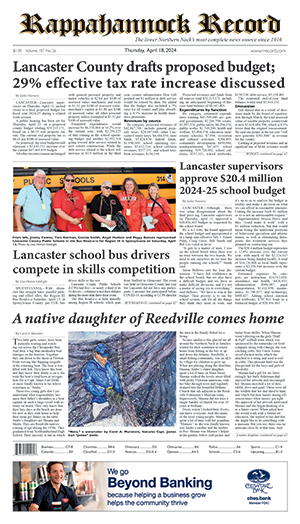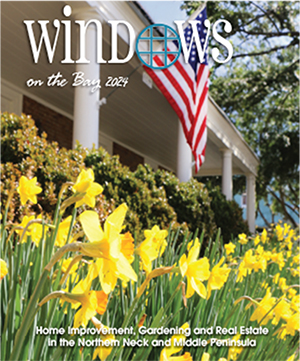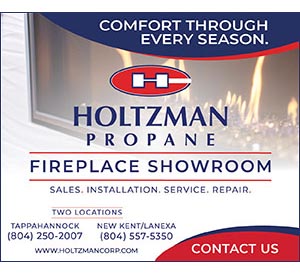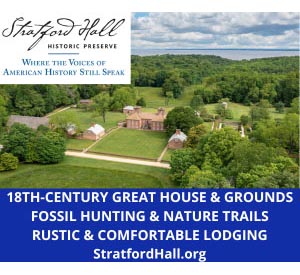
by Caroline Campbell
Karen Doyle is a livestock producer in Lancaster County. She raises heritage swine, sheep, turkeys and chickens.
Although many Northern Neck agriculturalists have been farm families for centuries, Georgiatown Farm’s success stands only on the past decade of Doyle’s hard work.
“I just started in 2009,” said Doyle. “I don’t have a background in ag, but I’ve been involved for 40 years with the high end food business.”
After parting from a long career in the food industry, Doyle began to seek out a local farm where she could purchase free-range chicken. Without any luck, she decided to fill the void and provide the product herself. She learned how to raise and process poultry by helping a friend with backyard chickens. Despite what may seem as a lack of experience, Georgiatown Farm had little trouble entering the farmers’ market for the first time.
“Everyone already knew me because I had been doing business here in the Northern Neck for nearly 20 years,” said Doyle. “They would ask, ‘Karen, what are you doing now?’ and I would say “well, I got some chickens and I figured if I wanted them other people wanted them too!”
By the end of the summer, Karen had sold 400 chickens and thus, Georgiatown Farm was born.
A day on the farm
Despite having an irregular schedule, Doyle always takes the time to check on her livestock twice a day.
“There’s no average (day) with animals, if you ask me,” said Doyle.
“I put my eyes on every animal on the farm every morning when I feed, which I do again in the evening when I collect the eggs,” she explains.
Unfortunately, caring for livestock demands much more than feeding and watering, and it is a lot to do by oneself.
“I always have things I need to do, fences to fix, things to be cleaned and I don’t have much help,” said Doyle.
Fortunately, Georgiatown Farm receives temporary relief from participating in the World Wide Opportunities on Organic Farms (WWOOF) program—where Karen hosts visitors and teaches them the day-to-day life on the farm—but the volunteers seem to come to the same conclusion: “Man, this is a lot of work!”
After sharing a few unsuccessful WOOFer stories, Doyle said that she could work circles around some men that are half her age. Despite this, some WOOFers put in their fair share; Doyle recalled that the week of rainstorms the Northern Neck had earlier this year was during the time when she had a WOOFer staying with her.
“We had to move my chickens out of their house and into the barn when they were only 4 weeks old. It was 9:30 at night and me and one other girl were moving 155 chickens in the pouring rain, in the dark.”
After moving the chickens to safety and drying them off with a towel, the chickens were saved from the flood. It was fortunate to have help fighting the storm that night. For the most part, however, Doyle runs Georgiatown Farm alone, she said.
As if farming solo weren’t difficult enough, supplying the demand for local meats is more challenging for small farmers near the coast than those in western Virginia. “There’s not a lot of livestock in Eastern Virginia, which has caused a problem with feed and a problem with processing,” said Doyle. “There’s not a lot of places to go.”
Due to the lack of livestock-related industries nearby, she travels 100 miles each way to purchase feed from an Amish mill in Maryland and 185 miles each way to process and pick up her market-ready pigs and sheep under USDA inspection. “It’s a long trip and it’s a long day,” she said.
Clearly, Doyle cares deeply for her livestock, because she tries to handle her animals often enough that their long trips are as comfortable as possible. “When I go to pick up my meat, I always get compliments on how calm my animals were,” said Doyle. “I just want to know that my animals are treated humanely—that’s very important to me.
In fact, Georgiatown Farm is renowned for their stance on the ethical treatment of animals; so much so, that the publisher of the book, CAFO (Concentrated Animal Feed Operation): The Tragedy of Industrial Animal Factories sent Doyle a free hardback copy. “I just don’t know very many people who raise animals that do what I do for them. Every one counts.”
The “Big” question
Of more than 7,600 species that the U.N. Food and Agriculture Organization has in its farm-animal database, 190 have kicked the bucket in the last 15 years—about one breed a month. How do you feel about the decreasing amount of genetic diversity in livestock?
“Because I raise a lot of rare breeds of livestock, I am a member of The Livestock Conservancy and am well aware of the crisis we are in.
“I always promote that I raise endangered breeds; we have lost 190 varieties of livestock in the last 15 years and you have to bring it to people’s attention. If we produce from a single breed and we have an epidemic, we could lose our entire population of animals because they are so genetically unanimous. That is very scary. I’m not interested in feeding the world – we have enough right here in our own backyard.”
Caroline Campbell is a summer 2018 intern with Virginia Cooperative Extension serving Northumberland and Lancaster counties.












